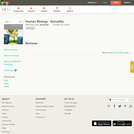
This lesson is designed to help students learn to access health care on their own.
- Subject:
- Health, Medicine and Nursing
- Material Type:
- Lesson
- Lesson Plan
- Author:
- Sexuality Education Open Learning
- Date Added:
- 08/04/2022

This lesson is designed to help students learn to access health care on their own.

This lesson is designed to help students learn to access health care on their own.

This lesson provides a brief overview of sexual and reproductive anatomy, and explains how to complete self exams of breasts and testicles. It reviews the basics of reproduction, and introduces the many ways of becoming parents. The final activity asks students to consider the many responsibilities of becoming a parent.

Students will learn about condoms as a form of contraception and STI prevention, as well as talk about safer sex strategies, communication, and how to reserach and access healthcare services and testing.

The lesson introduces students to various contraceptive methods used for pregnancy prevention. The lesson ends with a critical thinking exercise that asks students to figure out the best type of contraception for various teens in different situations.

This lesson reviews the basics of safer sex practices and contraception. It also introduces several laws in Oregon that revolve around consent, reproductive and sexual health access, medical consent, and more.

Building on the Introduction to Healthy Relationships lesson by the same authors, this lesson expands students’ understanding of healthy relationships. Students will review what healthy relationships look and feel like. Students will focus on how to assess the health of their own romantic and platonic relationships. The lesson also expands on power dynamics, boundaries, and consent as appropriate for older high school students. After an in-depth, discussion-based presentation reviewing these concepts, students will apply an evaluation process to review the health of fictional relationships in small groups.

In this lesson, students will deepen their understanding of gender expression through the use of anchor texts and a video. They will apply their understanding through a self-portrait that reflects an iteration of their gender expression.

In this lesson, students will learn about and practice the fundamentals of healthy communication and boundary-setting in order to strengthen healthy relationship skills. Students will identify characteristics of healthy & unhealthy relationships.

The Sexuality Student Edition book is one of ten volumes making up the Human Biology curriculum, an interdisciplinary and inquiry-based approach to the study of life science.

In this lesson, students will research how famous families came to be. They’ll work with their peers to uncover details about fertilization, gestation, and birth, as well as other aspects of the famous family’s story. Students will then demonstrate (orally or written) their understanding of the concepts from the past two lessons. They will also reflect on the role celebrities play in shaping our thoughts, feelings and behaviors around reproduction and families.

This first lesson (of three) explains sexual and reproductive anatomy, and human reproduction via penis-in-vagina sexual intercourse (PIV sex). During this lesson, the educator will model the use of respectful, inclusive concepts and language to describe the process of human reproduction and family formation.

This second lesson enables students to apply what they know about human reproduction via PIV sex (Lesson 1 of this series) to other means of reproduction. They will not only learn the steps in how insemination and IVF work to create a pregnancy, but they will also learn that people other than parents can provide the genetic material (eggs, sperm, and embryos) and give birth to a child for someone else (surrogates). Students will be working in small groups to help one another understand the concepts and to practice using the inclusive language that the educator modeled in the first lesson.

Students will explore the concept of gender expression through a sorting activity. Students will discuss showing respect for others.

This lesson details the basics of healthy relationships: what they are and how to recognize them. It also covers consent, boundaries, power dynamics, red flags, and characteristics of different kinds of relationships. Students will engage in discussions and activities in which they will identify characteristics and assess the health of relationships in brief scenarios.

Students will be introduced to the reproductive system and the following body parts: penis, testicles, scrotum, ovary, uterus, vulva, clitoris, vagina, bladder, urethra, and anus. Students will get a basic understanding of anatomical orientation, basic function, and variation of these body parts. Students will discuss such topics as safe space, safe adults, and diverse bodies.

The lesson provides a refresher on basic anatomy, as well as the processes of ovulation, menstruation, and pregnancy. It goes through the stages of pregnancy, and the pregnancy options available to Oregon residents. The lesson ends with a Jeopardy-style lesson recap.

The lesson presents a definition of sex and asserts consent is a key aspect of healthy sexual experiences. Students will define the various parts of consent and review Oregon’s laws regarding consent, sex, and minors. They will investigate what influences their decisions about sex, and will then follow a fictional couple through various decision-making processes around deciding to or not to have sex, the use of birth control, pregnancy options, and decisions around parenting. Students will also research local reproductive and sexual health clinics.

This lesson explains and differentiates between sex assigned at birth, gender identity, and sexual orientation. There is also a discussion of why personal pronouns matter. It emphasizes the importance of respecting everyone regardless of their differences and walks students through ways to interrupt bullying.

This lesson provides a very basic overview of common sexually transmitted infections (STIs) and the best ways to prevent their spread. STIs are extremely common (1 in 2 people will be exposed to one by the time they’re 25), so this lesson reinforces the importance of prevention, testing, and treatment.